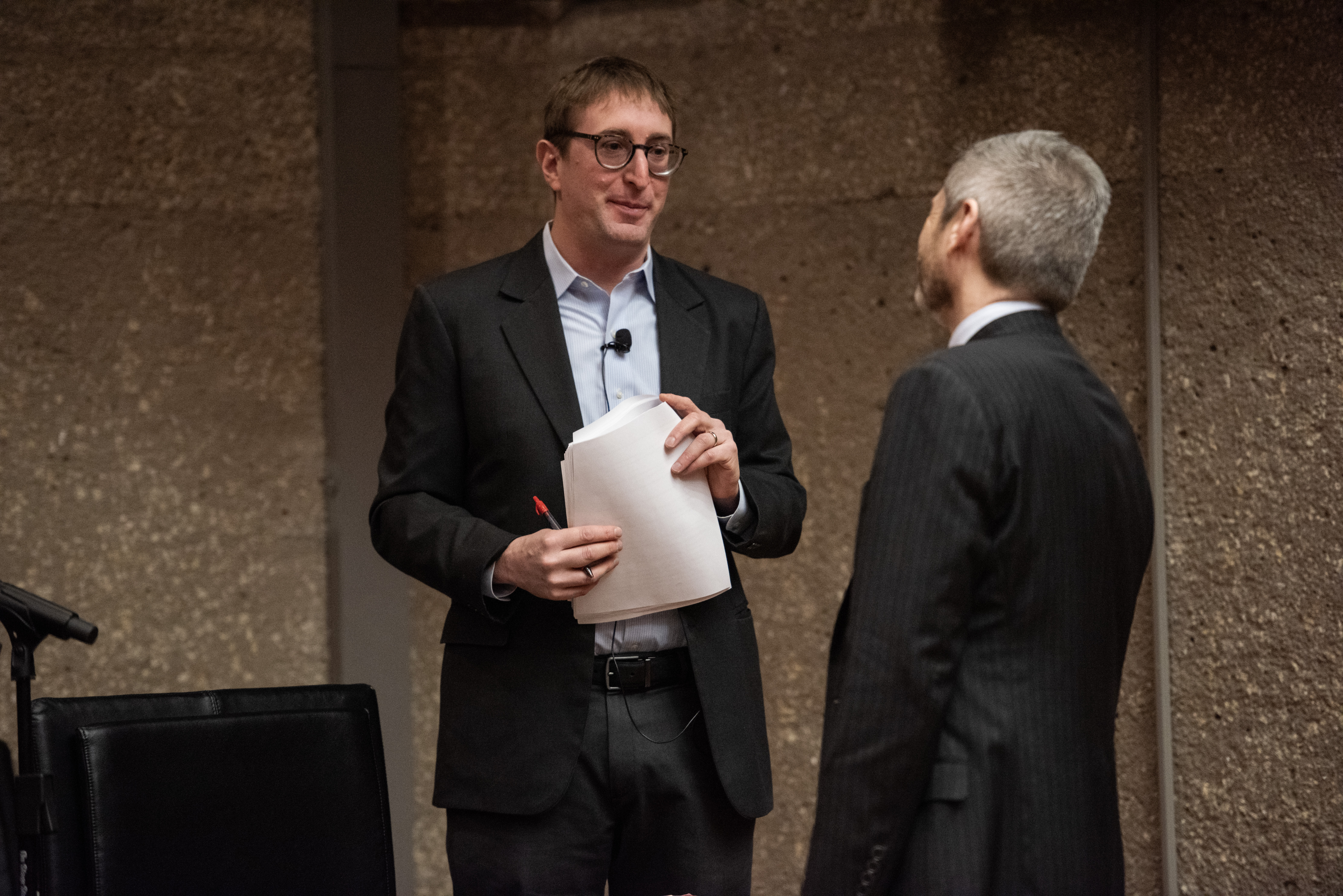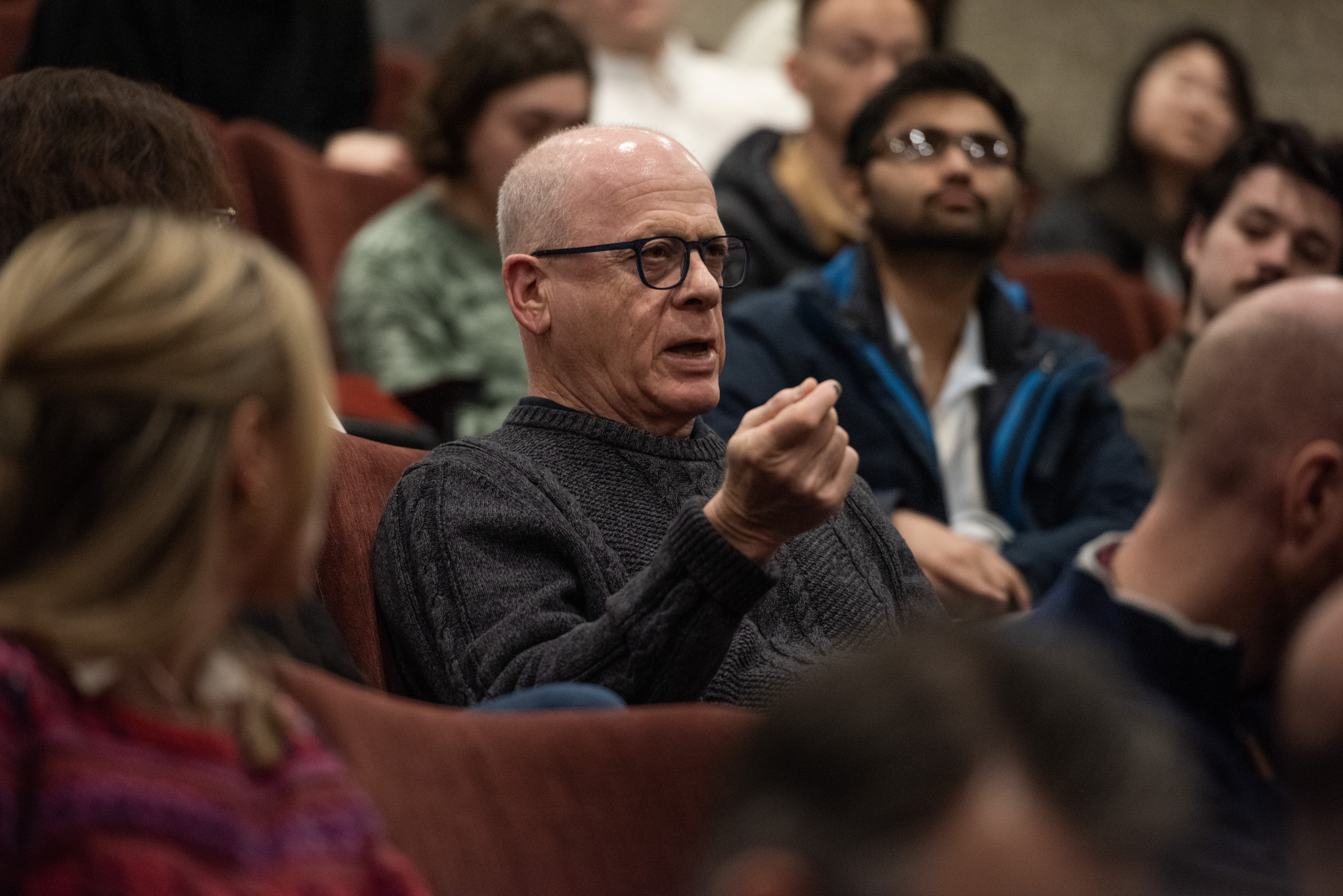Jacob Goldin Presents 2025 Coase Lecture: When Should Legal Rules be Used to Redistribute Income?
Conventional wisdom in law and economics holds that legal rules should be designed solely to promote efficiency, leaving income redistribution to the tax system. But when does this principle hold true, and when might it fall short?
Exploring this compelling question at the Law School’s 2025 Coase Lecture on February 18 was Jacob Goldin, the Richard M. Lipton Professor of Tax Law and recipient of the Donald M. Ephraim Prize in Law and Economics. A leading scholar in tax law, Goldin’s research examines the impact of US tax policy on low-income households.
The Coase Lecture, established in 1992, honors the late Nobel Laureate Ronald Coase, whose groundbreaking scholarship laid the foundation for the field of law and economics. Hosted annually by the Coase-Sandor Institute for Law and Economics, the lecture series highlights the Law School’s deep intellectual tradition in the area.
Thomas J. Miles, dean and the Clifton R. Musser Professor of Law and Economics, kicked off the 2025 lecture with brief introductory remarks.
The Trouble with Policies that Focus on Efficiency
“A lot of law and economics is about how to design legal rules that are efficient,” Goldin observed at the start of his lecture. “And a lot of the criticism of law and economics is that it’s about how to design legal rules that are efficient. The point is: by focusing on just efficiency, we may miss how legal rules shape the distribution of resources in society.”
Goldin started his lecture acknowledging that his topic draws upon the work of many other scholars. With that disclaimer, he framed his talk around three key points:
Law and economics, at its core, favors redistribution. “The normative framework underlying law and economics gives us principled reasons to prefer policies that shift resources from the rich to the poor,” he explained.
The availability of an income tax significantly narrows the need for redistribution through legal rules. “It’s usually better to adopt efficient legal rules and adjust the income tax, rather than adopt inefficient rules aimed at redistribution,” he said.
Despite the availability of the income tax, there are situations where the standard law and economics model supports deviating from efficient legal rules. This occurs when an inefficient legal rule could better promote social welfare—the overall well-being and satisfaction of individuals in a society.
To illustrate, Goldin presented a simple example: a city deciding where to build a new park.
- If the decision follows a strict efficiency-based rule, the park would be built in the wealthier neighborhood, where residents are willing to pay more for it.
- If the decision is based on overall welfare, the park might instead go to the poorer neighborhood, where residents have lower well-being and might benefit more.
“If we care about maximizing welfare, we shouldn’t necessarily follow efficiency,” Goldin argued. “In fact, we might put extra weight on the preferences of people in the poor neighborhood since their well-being is lower. Therefore, if we don’t make additional assumptions, we can’t say that law and economics necessarily supports the efficient rule. There are lots of situations where we’re going to think that law and economics is going to favor the inefficient rule, because the inefficient rule is going to do a better job at accomplishing well-being.”
How Does the Income Tax Factor In?
Goldin then examined whether the availability of an income tax changes these conclusions.
He posed a classic question: Should the amount of damages in a car accident lawsuit be adjusted based on the income of the person responsible—higher for a wealthy defendant, lower for a low-income one?
While this approach might seem like an effective way to redistribute wealth, Goldin noted its unintended consequences:
- Wealthy drivers would be excessively cautious to avoid higher damages.
- Low-income drivers might be less careful, knowing they face lower damages.
- The rule could also distort work incentives, discouraging people from earning more.
By contrast, Goldin explained, reforming the income tax to accomplish the same amount of redistribution would not distort how careful drivers choose to be, though it would still affect work incentives.
Goldin then described several situations in which the best way to promote social welfare could entail the use of an inefficient legal rule, even given the possibility of reforming the income tax. One such situation is an alternative damages rule for car accidents: basing damage amounts on the price of the vehicle rather than the driver’s income.
This rule would still accomplish some redistribution but, Goldin explained, “if differences in tastes for fancy cars was not only about differences in income, it might accomplish the redistribution in a more efficient way.”
After presenting these and other examples, Goldin ended his talk by concluding: “It’s not that we should always or even usually want to adopt inefficient legal rules to help with redistribution when there’s an income tax. Rather, it’s about the form that arguments for an inefficient legal rule should take in order to be persuasive.”


